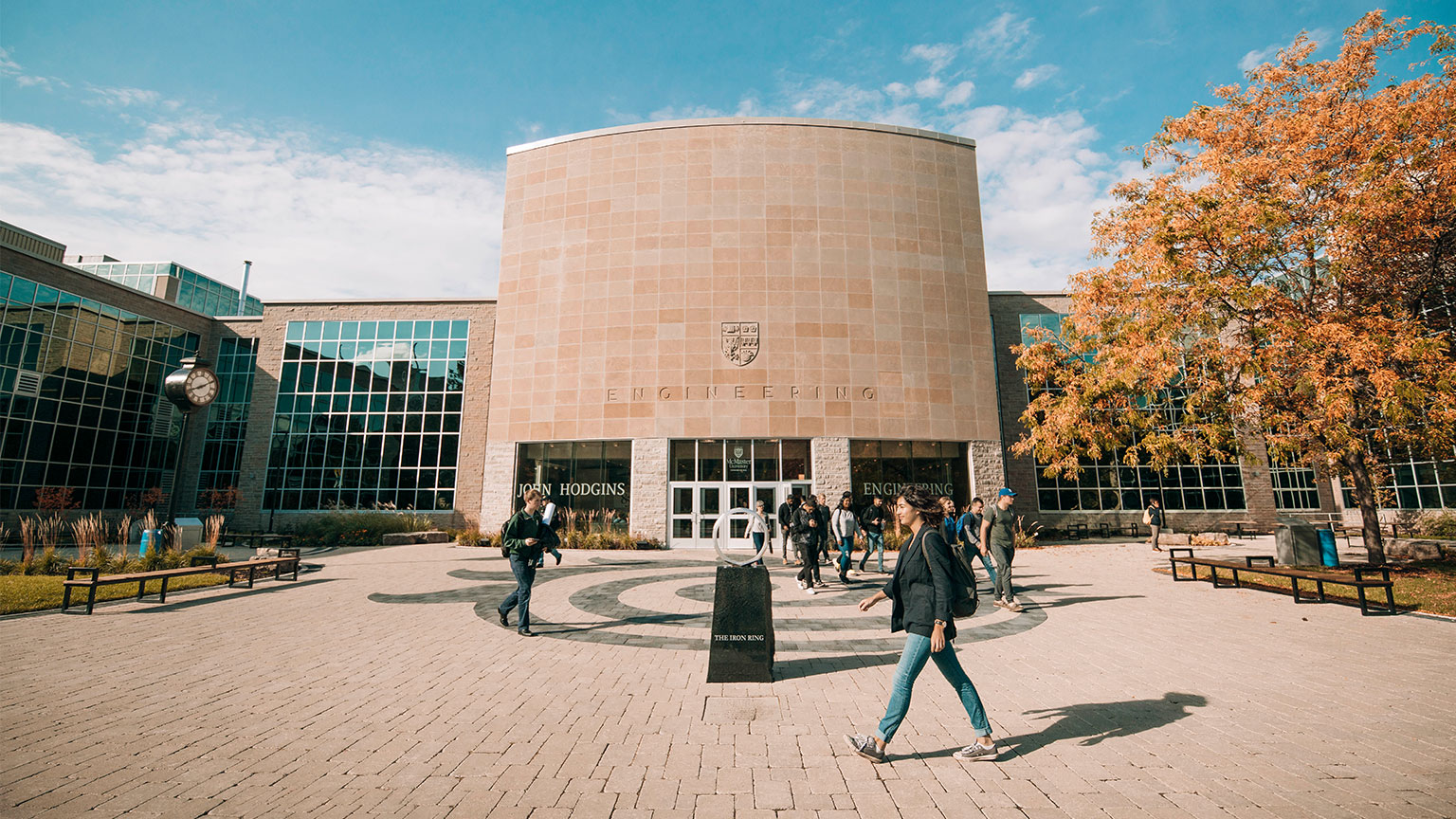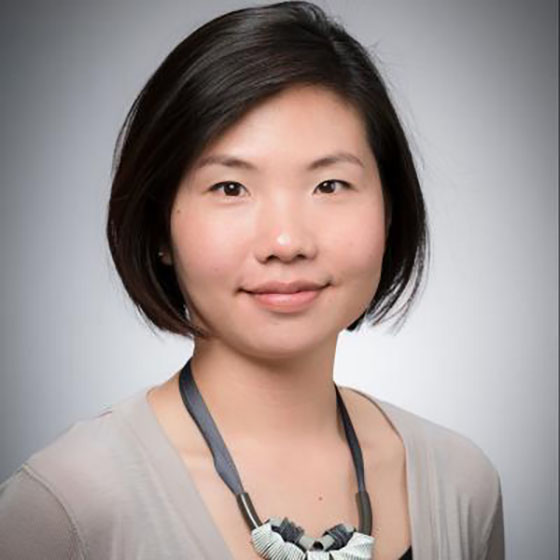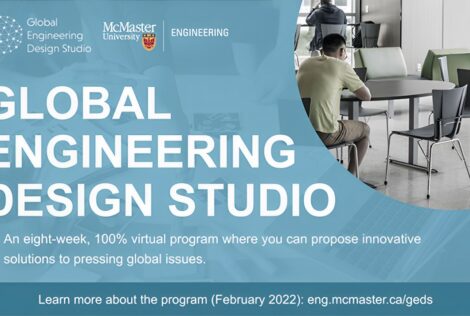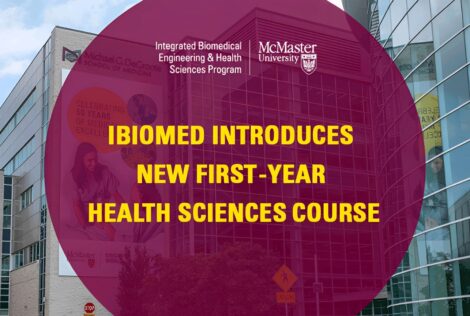

Two years after accepting the Educating the Engineer of 2025 (EtE-25) funding awards for education research projects, four McMaster Engineering faculty members share their findings and successes.
The EtE-25 awards, valued at a total of $80K, support initiatives that provide undergraduate and graduate students with the skills to succeed in 21st century leadership roles in industry, government, and academia while ensuring strong technical expertise.
“The funded projects are helping our faculty design 21st century learning environments and will assist our students in gaining the skills to succeed in 2025 and beyond,” said André Phillion, Director, Experiential Learning in the Faculty of Engineering and an an associate professor in the Department of Materials Science and Engineering. Phillion spearheaded the creation of the ETE awards in 2018.
The projects are part of The Pivot, the Faculty’s mission to transform engineering education to prepare students to be flexible in a rapidly-changing world and to meet challenges not yet imagined.
Read about the progress of the funded projects in the following Q&As:
Incorporating Inclusivity in the Engineering Experience

Project overview
Kim Jones, an associate professor of Chemical Engineering and Chair, Ontario Network of Women in Engineering (ONWiE), is building an inclusive culture at McMaster Engineering. Her project aims to understand how one’s identity affects teamwork; to implement inclusivity within micro-credential led leadership courses; and create a course on inclusivity in the engineering workplace.
What are your most interesting findings so far?
“I was very interested to find evidence in the literature and from focus groups about how important it was not to isolate women in teams.”
We now ensure that student teams have two or more women, or none, rather than spreading them out. We expect that this will have positive effects on the student experience, where all students feel their voices are heard and their contributions are valued.”
What are your next steps for this project?
“We have extended this project with funds from the Engendering Success in STEM Consortium and the McMaster COVID-19 fund to get a deeper understanding of virtual teamwork interactions in the new project-based first-year engineering course.”
What does this project mean for McMaster Engineering students and/or for engineering education at large?
“Being intentional, collaborating with social psychologists and using data-based decision-making to guide our design of student learning environments means that all students have the opportunity to become equally excited about engineering. The students are also very excited to learn about how much we care about their experiences.”
Expanding Experiential Opportunities

Project overview
A team of McMaster Engineering faculty members led by Elizabeth Hassan, an assistant professor of Mechanical Engineering, are expanding experiential learning opportunities for students. They are learning from the experiences of students on engineering technical teams to make the core program even more effective.
What was your most interesting finding from your first surveys and focus groups?
“The most interesting finding is actually a non-finding. Often researchers are disappointed that their study groups can’t be cleanly separated statistically; in this study the two groups, technical team participants and technical team non-participants, are more similar than they are different. If the students in both groups are essentially the same it means that almost any student I teach is capable of doing terrific technical work given the right environment and motivation.
We also contributed to online teaching resources for Mechanical Engineering CAD Tutorials that are publicly available.”
What are your next steps for this project?
“My research assistants are wrapping up the second data collection phase for the project which is looking at the differences between technical team participants and technical team non-participants on a computer aided design task. The goal of this work is to get more specific data about what skilled design performance looks like and collect insights from proficient designers to inform how we teach novice designers in our core curricular program.”
What does this research project mean for McMaster Engineering students and/or for engineering education at large?
“The possibility that all of our students are capable of outstanding technical work is really exciting.”
Integrated Cornerstone Design Projects in Engineering Course (1P13)

Project overview
Tom Doyle, an associate professor in the School of Biomedical Engineering and Electrical & Computer Engineering and Colin McDonald, Director, Engineering 1 created the Integrated Cornerstone Design Projects in Engineering (1P13) course which launched this September. It’s a full-year, project-based learning experience where students are exposed to a series of design projects that develop both their technical and professional skills.
How is the 1P13 course progressing so far? What is the feedback and engagement like from the students?
“The course is progressing really well. The sequenced delivery and integration of concepts across traditionally separate domains are providing students direct links to real problems and that helps students more easily understand new concepts. The feedback is very positive and the nature of how students work both independently and collaboratively has been very positive for engagement. The original vision of the course required students to have the tools to explore the concepts at home and I think that has been a big factor in the success of the course with students learning remotely.”
What does this course mean for McMaster Engineering students and/or for engineering education at large?
“In prior years, the four separate courses that combined to make 1P13 would be competing for student focus. The independent courses could try to explain the connection to other course concepts, but the integration required student assembly. The 1P13 model allows the instructors to acutely and progressively focus the student knowledge integration.”
Flipped-Classroom Finite Element Analysis Lab

Project overview
A team of faculty led by Silvie Tanu Halim, a lecturer in the W Booth School of Engineering Practice and Technology, supplemented existing finite element course material with instructional videos to improve and develop marketable skills for Engineering and Technology students in Finite Element Modeling and Analysis.
What were the most successful results from this project? What surprised you?
“Students became more independent, and I could focus on guiding students who had challenges during the live lab sessions. With the video resources, students were less stressed during the live lab sessions. They knew they could watch and re-watch the parts of the videos that were tricky or hard to remember. Students also mentioned that they would redo the lab by themselves at home and became more comfortable with the software and were able to find other ways to complete the lab.”
What does this project mean for McMaster Engineering students and/or for engineering education at large?
“Videos were accessible 24/7 and students were able to build their models using the student version of Ansys (engineering simulation and 3D design software) at no-cost. With the videos and instruction manual provided, students were empowered to carry out the lab more independently and were able to have more practice opportunities outside lab hours at home with minimal, one-on-one instruction.”
How did the pandemic impact this project?
“The timing worked out well as we introduced the project while shifting to online learning. With the materials, students did not miss out on learning the lab components. They were able to successfully complete an assignment and a project that heavily relied on Ansys with minimal help from an instructor or TA.”


